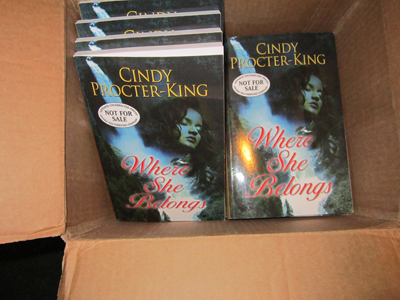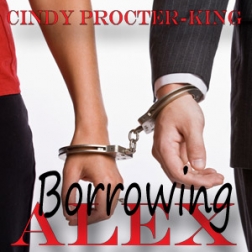Between Penny and, well, myself, I’ve published with several different publishers and have never received a box of print ARCs before (Advanced Reading Copies, for those not in the know). The “proofing” of the manuscript (the last chance an author has to catch errors in the typesetting before the “real” book is printed), for me, has always arrived by email in PDF form. So here I am, a good little writer, patiently waiting for the proofs for WHERE SHE BELONGS, my December release from Five Star/Cengage, to arrive in PDF form in my in-box, when a knock comes at the door.
I was expecting a delivery for My Liege, so wasn’t surprised to see a UPS van in the driveway. But the box the UPS woman delivered was much smaller than the package we’ve been expecting. Then she told me who had sent it—one of my publishers. I quickly scribbled in the little electronic window, raced to my office (already late for a doctor’s appointment), and tore open the box, wondering how my author’s copies could have arrived already when I hadn’t proofed the book yet,
Twit.
WHERE SHE BELONGS is being published in library-edition hardcover, but the box contained several trade paperback copies and a list of where Five Star/Cengage has sent the book for review. Now I need to read one of the copies for errors and report them to the publisher, if I do find any. Then, what do I do with these babies? First thing is to make a media kit and then mail kit and book samples to other review outlets (like Romantic Times). Seeing as I’m Canadian, I’ll also try a home-grown publication or two. It can hurt. The worst thing that can happen is a reviewer tries to sell my ARCs on eBay, which is a no-no.
Okay, I know you really want to see the ARCs, so here’s the box. Then I’ll blab some more:
Ain’t they a thing of beauty? Notice how Procter is spelled with an E? Henceforth, always spell Procter with an E! It’s time to tick off the Proctors of the world. We “ers” have had enough.
Now, see that little white sticker on each book? It says NOT FOR SALE. That’s because these are Advance Reading Copies and are only supposed to be used for review purposes. So if you’re a reader and have never seen a book with “Advance Reading Copy—Not For Sale” on it for sale at your favorite used book store, that’s very good. If you have ever bought an Advance Reading Copy thinking it’s something special and you’re supporting the author, well, you aren’t supporting the author and buying the ARC is…not very good. In fact it’s kinda bad. Authors really disprove of it. And so do publishers. These copies might have typesetting errors and are not for public consumption, so to speak. But if you don’t send ARCs to review sites and magazines months ahead of the book’s release, then the book won’t get reviewed in time. If the reviewer for wherever it’s sent chooses to review it.
Authors don’t make a penny–nay, not even a ha’penny—off the sale of ARCs. The only person making money off the sale of an ARC is the person selling it. Which is unlike buying your favorite author’s novels at your favorite used bookstore. You know, when they don’t say ARC on them. When someone has bought them new, hopefully read them, then taken them to the USB. USB book sales don’t earn authors any money, either. Authors only earn money (in the form of royalties—a tiny percentage of the cover price) on print books when that first initial sale is made, in the bookstore, drug store, or grocery store. OR from on-line bookstores selling the book NEW (as opposed to used). Every time a book is sold after that initial sale, at garage sales or used book stores or library “these books are worn out” sales, or EBay and similar sites, the author doesn’t make a dime. But generally we’re okay with that. Used book stores and the like can subject our work to a wider audience, and hopefully that audience will someday buy new (or ask for a copy of the book to come into their local library). But buying ARCs? Try to restrain yourself, I beg you.
That’s my lecture for the day. I didn’t intend to give one. It just somehow happened.
Now, let’s all clap for ARCs!!!

